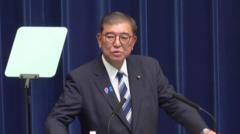Is Japan’s Prime Minister Shigeru Ishiba Resigning After Election Losses?

Published: 2025-09-07 10:27:03 | Category: world
Shigeru Ishiba's resignation as Japan's Prime Minister comes after a tumultuous tenure marked by significant electoral losses and growing political instability. His decision follows the Liberal Democratic Party's (LDP) unprecedented decline in parliamentary control, leading to questions about the future of Japan's governance amidst rising regional tensions.
Last updated: 04 October 2023 (BST)
Key Takeaways
- Shigeru Ishiba resigned after less than a year as Prime Minister.
- The LDP lost its majority in both the lower and upper houses during his term.
- Rising inflation and political controversies contributed to his declining support.
- Ishiba's resignation comes amid increasing tensions with China.
- The political landscape in Japan is now uncertain as a leadership change is imminent.
The Rise and Fall of Shigeru Ishiba
Shigeru Ishiba assumed office in October 2024, inheriting a challenging political climate. He took over with pledges to address pressing issues such as rising inflation and the cost-of-living crisis. However, his time in power was plagued by difficulties that ultimately led to his resignation.
Loss of Parliamentary Control
Under Ishiba's leadership, the LDP faced unprecedented electoral setbacks. In July, the party lost its majority in the upper house, a significant blow that followed a similar loss in the lower house. This marked the first time in 15 years that the LDP was not the dominant party in Japan's legislature.
Economic Challenges and Public Discontent
The economic landscape in Japan has been tumultuous, with rising prices hitting consumers hard. Notably, rice prices doubled over the past year, leading to widespread public dissatisfaction. Ishiba struggled to convey confidence and stability amidst these challenges, which eroded his support.
Political Controversies
Several controversies further tarnished Ishiba's image. His decision to appoint only two women to his cabinet drew criticism for lack of inclusivity. Additionally, the distribution of expensive gifts to party members raised eyebrows and contributed to perceptions of elitism within his administration.
International Relations and Tariff Negotiations
On the international front, Ishiba's tenure was marked by his attempts to negotiate tariffs with the United States. Following a recent deal with US President Donald Trump aimed at easing tariffs on Japanese exports, Ishiba felt it was the right moment to step down. He expressed a sense of responsibility to conclude these negotiations before resigning, describing the tariff dispute as a national crisis.
What’s Next for Japan?
With Ishiba's resignation, Japan faces a period of political uncertainty. The LDP, which has been in power for nearly seven decades, must now navigate the complexities of internal leadership elections. The outcome will not only determine the next prime minister but will also shape Japan's response to rising tensions in the Asia-Pacific region, particularly with China.
Potential Candidates for Leadership
As the LDP prepares for leadership elections, several potential candidates have emerged. These include prominent party figures with varying approaches to addressing Japan's economic issues and foreign relations. The selection of a new leader will be critical in restoring public confidence and stabilising the political landscape.
The Broader Implications
The political landscape in Japan is not only crucial for domestic stability but also has implications for international relations, especially with the United States and China. As Japan navigates its economic challenges and regional tensions, the choice of the next prime minister will play a pivotal role in shaping the country's future trajectory.
Public Sentiment and Future Prospects
Public sentiment is currently fraught with uncertainty. Many citizens are concerned about the direction of the country following Ishiba's resignation and the LDP's recent electoral failures. The new leader will need to address these concerns while also managing Japan's foreign relations and economic challenges effectively.
Conclusion
Shigeru Ishiba's resignation marks a significant turning point for Japan's political landscape. As the LDP prepares for leadership elections, the future remains uncertain. The next prime minister will face the formidable task of restoring public trust and addressing the pressing economic issues that have plagued the nation.
How will the upcoming leadership election influence Japan's future amid rising regional tensions? #JapanPolitics #ShigeruIshiba #LiberalDemocraticParty
FAQs
Why did Shigeru Ishiba resign as Prime Minister?
Shigeru Ishiba resigned due to significant electoral losses for the Liberal Democratic Party and growing public discontent over economic issues and political controversies.
What challenges did Ishiba face during his tenure?
During his tenure, Ishiba faced rising inflation, a cost-of-living crisis, loss of parliamentary control, and criticism over his cabinet appointments.
What are the implications of Ishiba's resignation for Japan?
Ishiba's resignation creates a period of political uncertainty for Japan, as the LDP must navigate leadership elections and address pressing domestic and international challenges.
Who are potential candidates to replace Ishiba?
Several prominent figures within the LDP are potential candidates for leadership, each with their own strategies for addressing Japan's economic and political challenges.
What role does the US play in Japan's political landscape?
The United States is a key ally of Japan, and Ishiba's recent tariff negotiations highlighted the importance of US-Japan relations in shaping Japan's economic policies and political stability.



